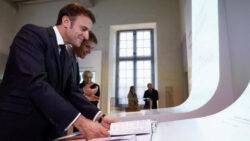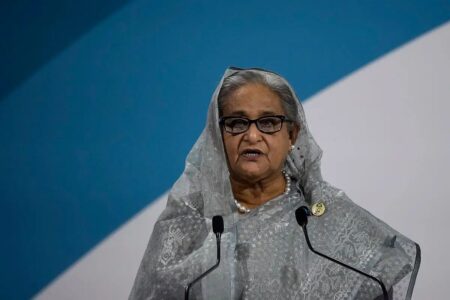French President Emmanuel Macron looked to cement his legacy, and take on political opponents, with the inauguration on Monday of a monument to the French language deep in far-right heartland.
Macron used the occasion to wade into a culture war debate, backing a right-wing bill to ban the use of “inclusive language” — a popular trend for using both masculine and feminine versions of words when writing.
France must “not give in to fashionable trends,” he said as he inaugurated the Cite Internationale de la Langue Francaise just hours before the Senate was due to debate the proposed law.
Modern French presidents love a cultural “grand projet” — an imposing monument to “scratch” their name on history, as ex-leader Francois Mitterrand put it in the 1980s.
Mitterrand was an avid and controversial legacy-builder, transforming the Louvre museum with a glass pyramid, and erecting the vast Opera Bastille and National Library.
Georges Pompidou built a famous modern art museum in Paris, and Jacques Chirac created the Quai Branly global culture museum on the banks of the Seine.
The practice fell out of fashion this century, but has been revived by Macron, who was already eyeing up a crumbling chateau in the small town of Villers-Cotterets while still a presidential candidate in 2017.
He has overseen the renovation of the Renaissance castle, completed in 1539 under King Francois I, and its transformation into an international centre for the French language.
It hopes to attract 200,000 visitors a year to its large library (replete with AI-supported suggestion engine), interactive exhibits and cultural events.
Perhaps fittingly, the website seems determinedly uninterested in the quality of its English translations, describing the castle as a “high place of the French history and architecture“.
‘Greatest asset’
France has long fretted about the erosion of its language under English assault, with its centuries-old Academie Francaise taking regular umbrage at the intrusion of phrases from “drive-in” to “fashionista” and “hashtag”.
Its latest fear is the impact of US-inspired gender politics.
“Inclusive” writing involves writing both masculine and feminine forms of words, separated by dots — for example “francais.e.s”.
The proposed law being debated by the Senate later Monday would ban such phrasing in education and all official texts, from work contracts to court documents to instruction manuals.
Macron appeared supportive, saying: “In this language, the neutral form is provided by the masculine. We don’t need to add dots in the middle of words to make it better understood.”
Far-right stronghold
As the home town of Alexandre Dumas, Villers-Cotterets is a fitting choice for the museum. The author of “The Three Musketeers” and “The Count of Monte Cristo” even took swordsmanship classes in the chateau.
But there is politics at play, too.
The town of 10,000 people, around 80 kilometres (50 miles) from Paris, lies deep in France’s northeast where factory closures and high unemployment have made the region a far-right stronghold.
“At a time when divisions are returning and hate is resurging… the French language is a cement,” said Macron.
The museum underlines that France is not the most populous francophone country — that prize goes to the Democratic Republic of Congo with its 100 million citizens.
The chateau will host the 19th summit of the francophone world next year, to which some 88 leaders are invited.
(AFP)





